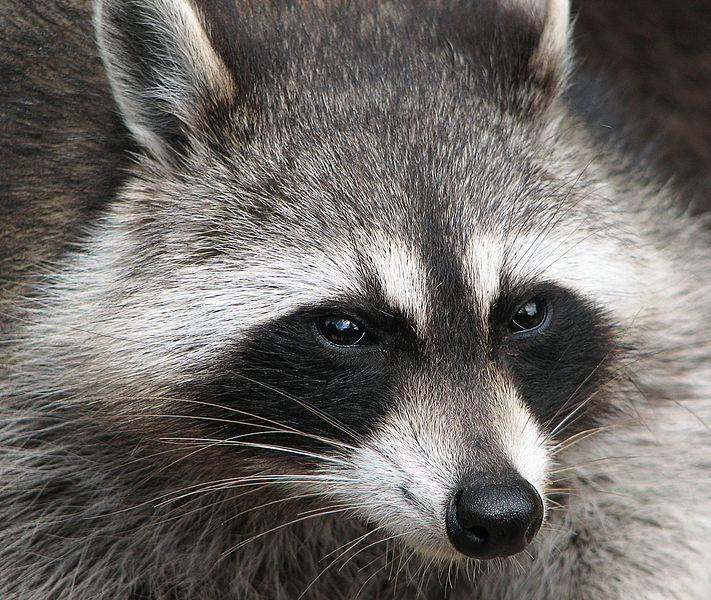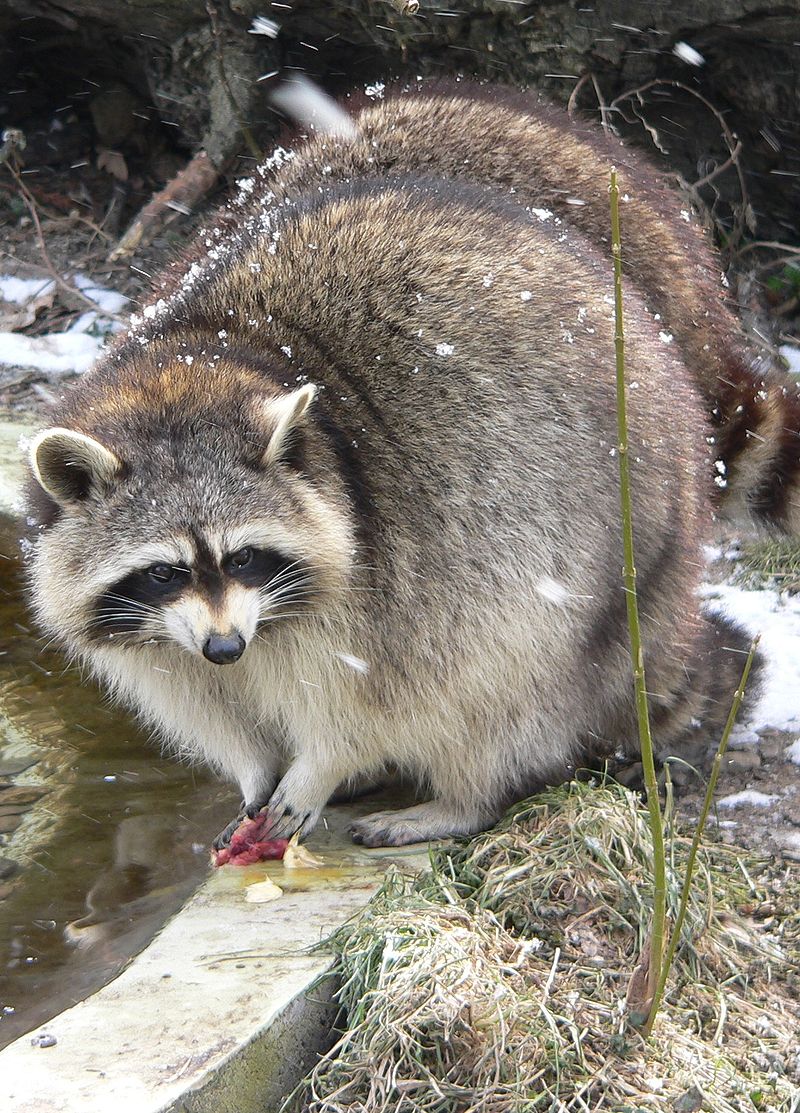(no subject)
Jun. 7th, 2019 09:19 pm Read the chapter here!
This is pretty much the end. Thank you everyone who's been reading! I'm really surprised and happy about how many people are reading/commenting/kudoing because I really thought this was gonna be a fic maybe two people read. I did up the total chapter count and I've started working on the fluffy epilogue although I haven't decided if I'm actually going to post it or not. I do love some fluff, so I probably will?
The epilogue will take place about a year later and I feel like it'll be 2k words at the most. If I don't finish and post it within two weeks, it's probably not happening. Although if I write it, I will likely post it somewhere.
Today's animal topic is focusing on the only animal mentioned in this chapter - raccoons! They're cute and smart and most people have no idea what they are, besides trash pandas. And they do love trash, but they are not bears. In some languages, their name does refer to bears, such as in German. Their scientific name as Kylo said is Procyon lotor. The lotor part means washing, and in many languages, their name makes reference to their washing behavior. Procyon means "before dog" because for a while, people thought raccoons and relatives were similar to the canine ancestor. But it's now believed they're actually most closely related to animals like weasels.

I mentioned that raccoons are often seen "washing" their food and that most names for raccoon refer to this behavior. It does look a lot like washing to human eyes, but they don't particularly care if their food is dirty. What they're doing is feeling it. Raccoons have an incredible sense of touch with really sensitive forepaws. In the wild, they are only doing this while foraging in the water. They'll pick up a food item and hold it under water and feel it. If they're finding food on land, they don't do this. In captivity, raccoons have been observed taking whatever kind of food they've been given to the water.

What do they eat? Typically, they'll eat whatever they can find, including trash. They are in the carnivore family, but they don't usually hunt anything large. It's usually more fish, amphibians, and bird eggs, as well as seeds, nuts, and fruits. Although they don't usually hunt large things, they can kill smaller animals, including poultry and smaller cats and dogs.
This can be a problem because these guys are very well adapted to living around people. Even in urban areas, you can find raccoons. They've really grown accustomed to being around people and we create lots of trash that they like to eat. But this isn't always a good thing. If you have small animals, obviously you don't want them getting attacked by a raccoon. But they can be dangerous to humans. This is mostly because they carry rabies. Rabies affects animal behavior and makes them less flighty and more willing to let other animals approach. So if the animal is already used to being around people and lives in a city, this can create a very dangerous situation.
This doesn't mean raccoons are bad, but there's a few things you can do to keep yourself safe. One, make sure your pets have their rabies shots. This way, if they do get bit, they're protected. Two, don't feed raccoons. You should never feed any wild mammal. What it does is it tells them that people are a source of food and they will keep coming back. If they were nervous at first, it doesn't take long for them to lose that fear. Three, if you have places in your house like attics, you want to make that inaccessible to raccoons. They will have babies inside houses, and it can be tricky to raccoon proof a place, but it is doable. And four, never, ever touch a wild raccoon. If it comes up to you, it's probably best you scare it off so it learns that people are dicks. In the best case scenario, a raccoon approaching you just wants food. In the worst case, it has rabies and is going to bite you.

Please don't do this.
If you are bit by a raccoon, you do need to get rabies shots. I think there's five that you're supposed to get? All I know is that it's not pleasant. If you don't get the shot, you have a 99.9% chance of dying. I believe one person has been saved after developing symptoms of rabies.
Although raccoons are native to North America, they have been imported as pets to other parts of the world such as Japan and Europe. They are considered an invasive species although how much effect they are having on native wildlife isn't certain. Although it is legal in some places to keep raccoons as pets, it is not recommended.
Raccoons are very intelligent animals, which means they will get into trouble. To make things worse, they have very dexterous paws and can open things that other animals can't do. My friend who works at a rehab says they are the worst animals they have to deal with. They are also social animals, which means you need to keep at least two. They can also be aggressive, even if raised by humans. The other huge issue is that people usually don't give them the best diet. Feeding them exclusively cat food can make them sick. They need a variety of foods, including meat, seafood, eggs, and fruits and veggies. With wild animals, it is best to mimic their natural diet as best as possible.
So that's raccoon basics. There may be another chapter but this is probably it for the wildlife posts. But who knows. We did have an interesting conversation on the Kylux discord about animals today...
This is pretty much the end. Thank you everyone who's been reading! I'm really surprised and happy about how many people are reading/commenting/kudoing because I really thought this was gonna be a fic maybe two people read. I did up the total chapter count and I've started working on the fluffy epilogue although I haven't decided if I'm actually going to post it or not. I do love some fluff, so I probably will?
The epilogue will take place about a year later and I feel like it'll be 2k words at the most. If I don't finish and post it within two weeks, it's probably not happening. Although if I write it, I will likely post it somewhere.
Today's animal topic is focusing on the only animal mentioned in this chapter - raccoons! They're cute and smart and most people have no idea what they are, besides trash pandas. And they do love trash, but they are not bears. In some languages, their name does refer to bears, such as in German. Their scientific name as Kylo said is Procyon lotor. The lotor part means washing, and in many languages, their name makes reference to their washing behavior. Procyon means "before dog" because for a while, people thought raccoons and relatives were similar to the canine ancestor. But it's now believed they're actually most closely related to animals like weasels.

I mentioned that raccoons are often seen "washing" their food and that most names for raccoon refer to this behavior. It does look a lot like washing to human eyes, but they don't particularly care if their food is dirty. What they're doing is feeling it. Raccoons have an incredible sense of touch with really sensitive forepaws. In the wild, they are only doing this while foraging in the water. They'll pick up a food item and hold it under water and feel it. If they're finding food on land, they don't do this. In captivity, raccoons have been observed taking whatever kind of food they've been given to the water.

What do they eat? Typically, they'll eat whatever they can find, including trash. They are in the carnivore family, but they don't usually hunt anything large. It's usually more fish, amphibians, and bird eggs, as well as seeds, nuts, and fruits. Although they don't usually hunt large things, they can kill smaller animals, including poultry and smaller cats and dogs.
This can be a problem because these guys are very well adapted to living around people. Even in urban areas, you can find raccoons. They've really grown accustomed to being around people and we create lots of trash that they like to eat. But this isn't always a good thing. If you have small animals, obviously you don't want them getting attacked by a raccoon. But they can be dangerous to humans. This is mostly because they carry rabies. Rabies affects animal behavior and makes them less flighty and more willing to let other animals approach. So if the animal is already used to being around people and lives in a city, this can create a very dangerous situation.
This doesn't mean raccoons are bad, but there's a few things you can do to keep yourself safe. One, make sure your pets have their rabies shots. This way, if they do get bit, they're protected. Two, don't feed raccoons. You should never feed any wild mammal. What it does is it tells them that people are a source of food and they will keep coming back. If they were nervous at first, it doesn't take long for them to lose that fear. Three, if you have places in your house like attics, you want to make that inaccessible to raccoons. They will have babies inside houses, and it can be tricky to raccoon proof a place, but it is doable. And four, never, ever touch a wild raccoon. If it comes up to you, it's probably best you scare it off so it learns that people are dicks. In the best case scenario, a raccoon approaching you just wants food. In the worst case, it has rabies and is going to bite you.

Please don't do this.
If you are bit by a raccoon, you do need to get rabies shots. I think there's five that you're supposed to get? All I know is that it's not pleasant. If you don't get the shot, you have a 99.9% chance of dying. I believe one person has been saved after developing symptoms of rabies.
Although raccoons are native to North America, they have been imported as pets to other parts of the world such as Japan and Europe. They are considered an invasive species although how much effect they are having on native wildlife isn't certain. Although it is legal in some places to keep raccoons as pets, it is not recommended.
Raccoons are very intelligent animals, which means they will get into trouble. To make things worse, they have very dexterous paws and can open things that other animals can't do. My friend who works at a rehab says they are the worst animals they have to deal with. They are also social animals, which means you need to keep at least two. They can also be aggressive, even if raised by humans. The other huge issue is that people usually don't give them the best diet. Feeding them exclusively cat food can make them sick. They need a variety of foods, including meat, seafood, eggs, and fruits and veggies. With wild animals, it is best to mimic their natural diet as best as possible.
So that's raccoon basics. There may be another chapter but this is probably it for the wildlife posts. But who knows. We did have an interesting conversation on the Kylux discord about animals today...